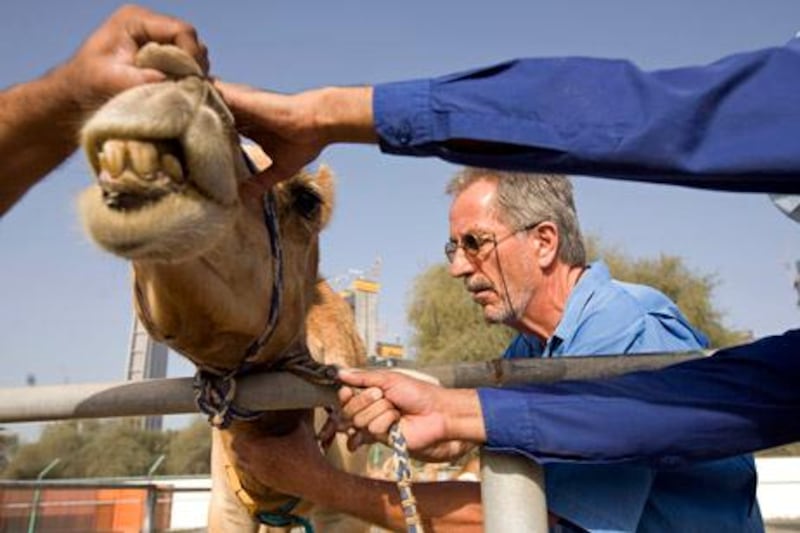ABU DHABI // Camels could be responsible for passing the deadly Mers coronavirus to humans, a study suggests.
The research, which includes work by a Dubai-based husband and wife team, has linked the animals to Middle East respiratory syndrome coronavirus (Mers-Cov).
Forty-six people have died from the virus and there have been 94 confirmed cases in humans - 71 of them in Saudi Arabia. There have been five confirmed cases in the UAE, and an Emirati man died in hospital in Germany in March.
The preliminary study linking Mers to camels was carried out by the Netherlands National Institute for Public Health and the Environment and was published in the Lancet medical journal.
Dr Ulrich Wernery, director of the Central Veterinary Research Laboratory in Dubai, and his wife, Renate, worked alongside teams in Holland and Hong Kong.
They found traces of antibodies against the Mers virus in dromedary camels, but not the virus itself.
"We are still in the middle of the investigation but it is very clear that camels have antibodies against the virus, so they have had contact, but none has so far had the virus," Dr Wernery said.
Cases of Mers, which can cause coughing, fever and pneumonia, have been confirmed in the Middle East, Britain, France, Germany, Italy and Tunisia.
"The virus is somewhere. The camels came in contact with this virus somewhere and somehow and, so far, the virus has not been isolated," Dr Wernery said.
"Some day we will find it - maybe in a camel - but also in other animals. We don't know. Sheep, goats and cattle, they have other coronaviruses. It is common they come in contact with it and show no clinical signs."
The virus has also been linked to bats, although Dr Wernery said it would be at least another six months before researchers found the source of the disease.
"It is very interesting the virus, and that the camels came in contact with this virus and produced antibodies against it," he said. "However, we haven't seen any camels with respiratory problems.
"They produced a lot of antibodies with no signs."
A six-member team in Dubai is now checking samples against a reference sent by the Dutch team.
"We hope to isolate the virus from the faecal samples of random camels and take swabs from the respiratory tract," Dr Renate Wernery said. "If we find evidence of a virus that is suspicious, alarms bells will ring. We'll isolate it and work with the other groups. We sit in the middle of the hurricane here and can do a lot of research."
The Dubai team is in daily contact with the World Organisation for Animal Health (OIE), the world body for infectious diseases in animals.
The study took blood samples from animals in Oman, the Canary islands, the Netherlands and Chile. It found all 50 camels tested in Oman, and 15 of the 105 Spanish camels, had antibodies against Mers-CoV. European sheep, goats, cattle and other camels had no traces of the antibodies.
It is not the first time the Central Veterinary Research Laboratory has worked on international outbreaks. Four years ago it tested for swine flu, with most human samples being sent to the Dubai lab. The team helped identify 40 new strains of swine flu and sent the findings to the World Health Organisation.
eharnan@thenational.ae





